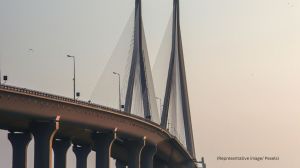Duckworth, Lewis work on new plan
In a world cup replete with talking points, the latest is the Duckworth-Lewis method of deciding rain-affected matches that saw South Africa...

In a world cup replete with talking points, the latest is the Duckworth-Lewis method of deciding rain-affected matches that saw South Africa exiting the tournament. As the criticism flies thick and fast, Frank Duckworth, speaking to The Indian Express, has revealed that they are working on a new system.
‘‘Bizarre situations can still happen, they could happen under any rule’’, Duckworth said. ‘‘That is why we are working at an alternative method. Not necessarily a better method, but an alternative method that will focus on probability of victory rather than the margin of victory based on resources in hand.
|
Lewis (front) and Duckworth
|
‘‘We are trying to reach a situation where we can ascertain the probability of victory of both the teams, and set a revised target accordingly’’, he said. The chief motive is to “avoid a ludicruous and unfair situation”.
Duckworth and Tony Lewis, both mathematicians, developed the current system in 1992 and it has been mandatory since the 1999 world cup.
Duckworth, currently with the Royal Society of Statisticians, is aware of the criticism directed their way, especially following South Africa and West Indies’ exits from the World Cup. But he accepts it phlegmatically. ‘‘People are always going to be unhappy if they lose. South Africa lost because of their own mistakes. The other day, both Shaun Pollock and Sanath Jayasuriya had the same papers (with the run-rates). Sanath read it right and Shaun didn’t. As far as we are concerned, the rules were agreed upon by all countries before the Cup, and no one has complained yet.’’
D/L would be infructuous, of course, if the practice of reserve days was applied, as the current clamour demands. ‘‘We would rather see a game finished properly, but a rain rule has to be in place’’, Duckworth says. ‘‘A reserve day should also be in place, but it is for the organisers to decide. It must have been considered, there must be reasons why it wasn’t done.’’
Did they ever consider the possibility of different calculations according to different grounds and weather conditions, as do some of the cricketers’ ratings systems? ‘‘The key is simplicity. We accept that the calculation should perhaps be different for each country, or even for each ground, and there is no reason why any cricket authority may not choose the value it believes to be the most appropriate.’’
Duckworth calls himself an “armchair cricketer” who can “talk a great game of cricket”; Lewis, he says, has played the game at various amateur levels. He started working on the method much before South Africa’s exit from the 1992 World Cup.
‘‘What the 1992 semifinal did was highlight the fact that a logical and mathematical approach was needed to solve the problem. And that the prevalent Australian rule wasn’t thought through as much as it should have been.’’
The whole process took a concrete shape only after the 1992 World Cup. Duckworth presented his theory to the Royal Statistical Society in Sheffield; met Lewis, made a presentation to the English cricket board; after which countries started accepting the method, and it was finalised by the ICC in 1996.
He hasn’t been able to watch much of the current world cup: in Australia, which he’s been touring, they are telecast in the middle of the night. He backs the Aussies, though he feels Tendulkar on his day can beat them.
‘‘With great respect to Sachin, I don’t think there’s any team out there that’s better than the Australians. But at the end of the day, all it takes is one good day tobeat even the best of teams.’’
A little help from Messrs Duckworth and Lewis wouldn’t hurt, either.
Photos



- 01
- 02
- 03
- 04
- 05




























